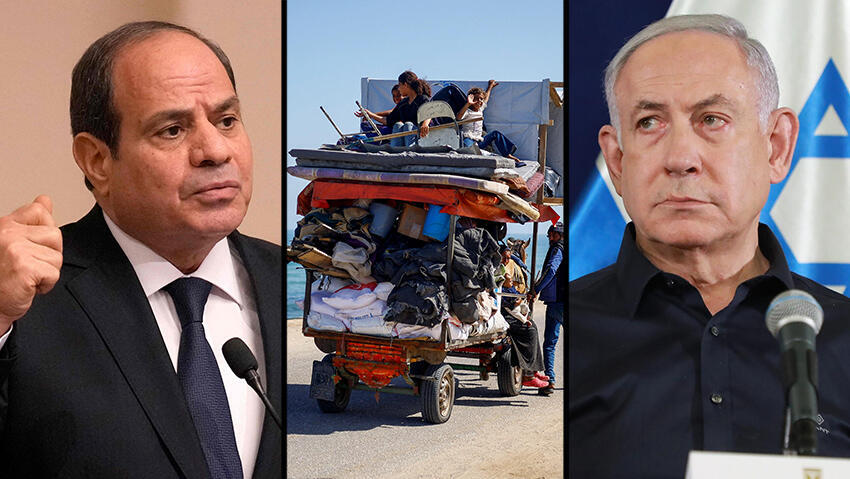Egypt's Foreign Ministry announced Sunday its intention to support South Africa's application against Israel at the International Court of Justice (ICJ) in The Hague.
Cairo's declaration comes in response to what it describes as "an escalation in Israeli attacks against civilians in Gaza." The tension between Israel and Egypt has reached a new high amid recent public objections from Cairo to the operation in Rafah.
Israeli forces conquer Gaza side of Rafah crossing
(Video: IDF Spokesperson's Unit)
The ministry also renewed its call for the UN Security Council to take immediate action to cease fire in Gaza and halt military operations in Rafah. The ministry criticized the Israeli assaults in Gaza, saying they "have created unlivable conditions, directly impacted civilians and destroyed infrastructure."
Since the start of the operation in Rafah, tensions between Egypt and Israel have escalated due to severe disagreements over its nature and concerns that it could lead to a surge of Palestinian refugees into North Sinai, where a "heightened alert" was declared following the IDF's approach to the outskirts of Gaza’s southernmost city.
Roughly 300,000 Palestinians have left Rafah since the evacuation of the population began. IDF also took control of the Gazan side of the Rafah crossing, which has since been closed to humanitarian aid. Cairo views this as a violation of sovereignty and has refused to transfer goods to Israel’s Kerem Shalom crossing.
Washington and Jerusalem believe that Egypt is applying pressure on Israel to withdraw its forces from Rafah. A source familiar with the details reported that CIA Director Bill Burns, along with other senior U.S. officials, attempted to persuade Cairo to allow aid through the Kerem Shalom crossing, but Egypt refused.
1 View gallery


Egyptian President Abdel Fattah el-Sisi and Prime Minister Benjamin Netanyahu
(Photo REUTERS/Mohammed Salem, Christophe Ena / POOL / AFP, Dana Kopel)
An Egyptian official told the New York Times that Cairo would not allow aid to flow to Kerem Shalom while Israel keeps the Rafah crossing closed, as it is a matter of national sovereignty.
The IDF reported on Sunday that the 162nd Division continues targeted operations in eastern Rafah and the Gaza side of the Rafah crossing. During these operations, Givati Brigade combat teams discovered and destroyed several tunnel shafts and ready-for-use rocket launchers. Additionally, 401st Brigade combat teams identified ten Hamas terrorists emerging from a terrorist site, armed and ready. Israeli Air Force aircraft and combat teams attacked and eliminated the threat.
In February, the ICJ dismissed South Africa's request for additional temporary measures against Israel regarding actions in Rafah, stating that "the severe situation necessitates the immediate and effective implementation of the already granted temporary measures, and does not require additional ones."
The court also added that Israel must fully adhere to its commitments under the Genocide Convention to ensure the safety and security of the Palestinians in Gaza.
A month prior, the ICJ issued six orders against Israel, calling for the introduction of more humanitarian aid into Gaza, prevention of genocide incitement and punishment for those calling for its execution. Another order stipulates that Israel must submit a compliance report to the court within a month.
Previously, the court determined it had jurisdiction to consider whether a genocide had occurred in Gaza, acknowledging the validity of South Africa's demand to protect Gaza's civilians. Turkey has also joined the ICJ application.





